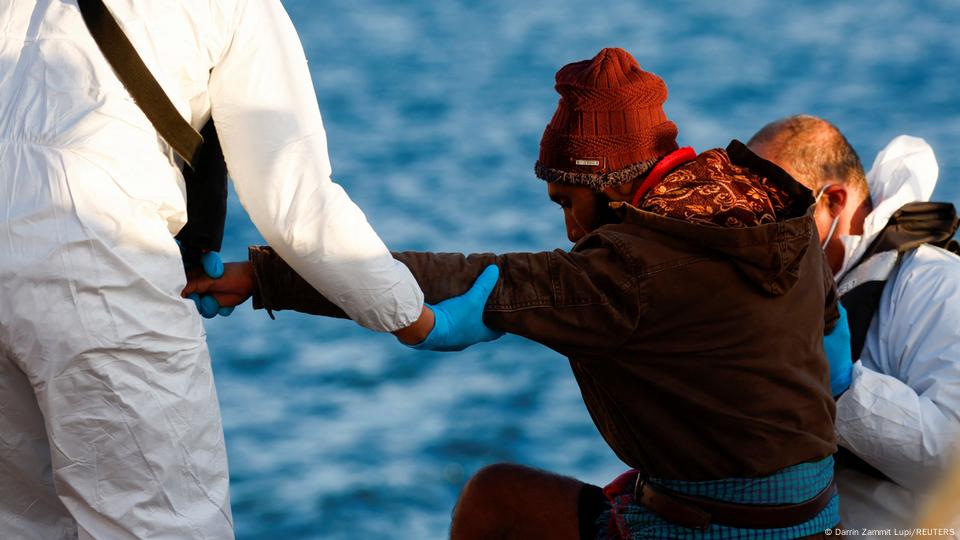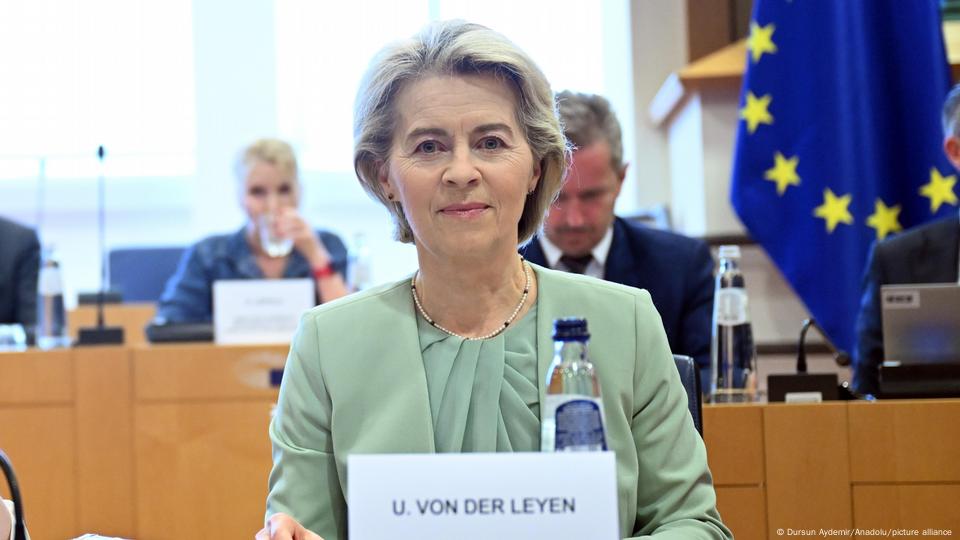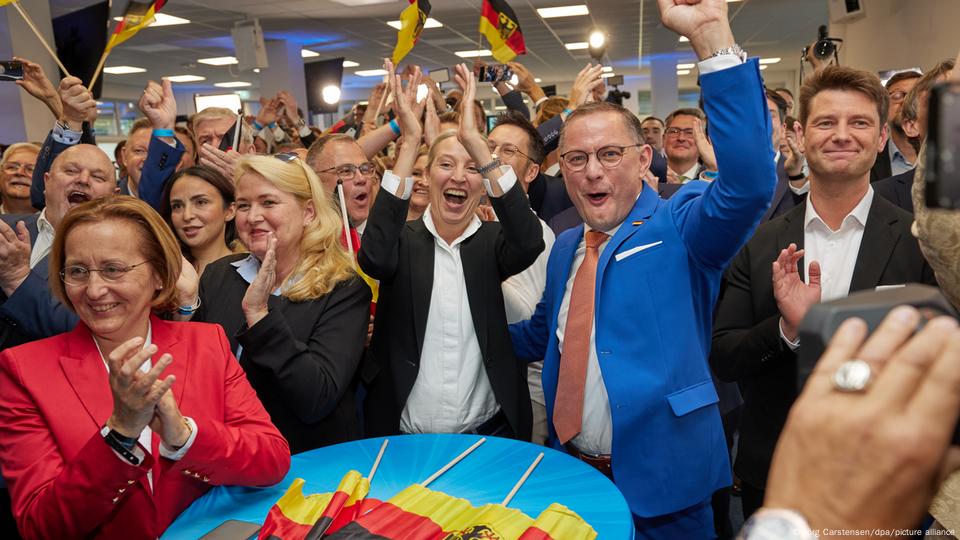In this interview — conducted before Germany’s decision to re-introduce border checks — EU Parliament President Roberta Metsola spoke about disinformation, migration and the right-wing surge in the EU election.
Right before the EU elections in June, the then European Parliament media chief Jaume Duch told me that an information war is being waged against the EU. You saw disinformation on your son’s phone. What did you feel as a mother and a politician?
Roberta Metsola: First concern, then resolve.
I was concerned. “Will this disinformation influence his choices? Had the school taught him to distinguish fact from fiction?” I thought: “If this is happening to a boy whose mother is a candidate in the elections, what influence would it have on a person who is very far away from politics?”
Then came the resolve: Fix it. Fix it with strong legislation that will enable us to act strongly, politically against those who are essentially trying to undermine the EU’s political system.
At the Campus Poland of the Future conference in Olsztyn in late August, you complained that the Member States are reluctant to implement even the best legislative answers to European problems.
Metsola: Absolutely.

What are the issues you are most concerned about?
Metsola: Corporate social responsibility, gender rights — we need more women in various boards — whether our laws that tackle violence against women across the EU are strong enough to protect them and, considering where I come from, migration.
You said in Olsztyn that behind every migrant story is a human being. Yet at the same time, the EU is adopting stricter migration rules — and Member States are doing the same on their own — to make the Schengen zone endure. How can a balance be found between the EU as a human rights beacon and the realpolitikof “fortress Europe?”
Metsola: It’s not an easy question. It is exactly because of our inability as the EU to find that balance that our migration policy has been failing for so long.
We have so many different national contexts — land borders, sea borders. I was speaking also from the perspective of a citizen of Malta, an island migrants are trying to reach.
I’m not a politician who would say “let’s make sure that Europe does not open its door to anyone.” I have met too many people who had no choice but to place their child on a boat, because it was safer than on land.
In the past five years we have seen the temporary reintroduction of internal border controls in many EU countries.
Metsola: The Schengen freedom of movement is sacrosanct. We fought so hard to get it. Extending internal border controls can only be done with a balanced and comprehensive approach to migration — not one that would create a silo.

Roberta Metsola comes from EU Member State Malta, an island that many migrants attempt to reach by sea Image: Darrin Zammit Lupi/REUTERS
For many years we would say that the EU focuses on the countries that border it. We held summits with them, telling them we’ll invest in them on the condition that they take back their migrants. I think it will require a revolution in our international relations to develop a more coherent migration policy.
How do we find the middle road?
Metsola: I believe that the Migration Pact we adopted in March can start to work on that middle road. On the one hand, solidarity between the Member States; on the other, strong external border protection — obviously different on land and on sea, the return of those who are not eligible for protection, but not isolating our migration policy from our neighborhood and development policy.
But again, we can have the best laws on paper, but if they are not implemented, then they will never work, and citizens will feel cheated.
Don’t you feel a bit powerless as the president of the institution that actually votes on these laws? After all, it is up to national governments to implement them. Don’t you wish you had some sort of figurative baseball bat to force the leaders of the Member States to implement these laws?
Metsola: Well, I see that as a little bit of my role. I have a very good relationship with the leaders of the Member States, and I present them with the fact that we are now directly elected.
The interesting situation is that all EU prime ministers are party leaders, and during the EU election campaign, they were committing, among other things, to a better implementation of EU acquis [the legislative application all EU candidate countries need to fulfill before being considered for accession – ed.].
I will hold them to it. Whenever I go to the European Council, whenever I meet any of the leaders, either individually or with my colleagues, it is my job to do it.
In early 2024, Time magazine wrote that “Metsola wants the parliament to have the power its name implies and generate laws itself.” In the light of war, migration pressure, climate change, struggling industries and the Green Deal, do you see any chance for the European Parliament to actually carve out a bit of power for itself?
Metsola: I would say that we’ve already done it. For example, the Media Freedom Act would not have been possible without a non-legislative report from the parliament.

Roberta Metsola says the European Parliament will hold EU Commission President Ursula von der Leyen (pictured here) and her commissioners to account Image: Dursun Aydemir/Anadolu/picture alliance
Also, look at the power the parliament wields in terms of budgetary negotiations, for example, making sure that the money goes to Ukraine, or the framework programs for EU candidate countries, the solidarity funds, Erasmus, Horizon… Without the parliament, the amounts of EU money for these programs would never have been so visible, so effective.
Now, from a legislative perspective, where does the parliament not yet have competence? Foreign affairs.
The parliamentary hearings for commissioners-designate will begin soon. Isn’t that the first and last moment when they say and do what the EP wants, and once they’re voted in, then off they go?
Metsola: I don’t think this chamber will allow that to happen. This is the first time I’m going through this process as president of the parliament and I want all commissioners to be absolutely willing to face — and respond to — tough questions from the MEPs according to their portfolio.
We expect commitments from the Commission President and her designated commissioners, and we will hold them to account.
At the press conference with Ursula von der Leyen after the vote on her second term, you said that you saw, on the Commission’s side, the acknowledgement of a stronger parliament and the will to cooperate with it. After the last five years, are you really optimistic that the institutions will cooperate?
Metsola: If the last five years showed us anything, it is that even in areas where there once was no cooperation, there was cooperation when we had no choice. I refer specifically to the Russian invasion of Ukraine and the immediate responses that had to be taken. We saw great cooperation on the political and the legislative level.
Would I have wished for more? Absolutely. Would I have expected some commissioners to be more respectful towards the parliament? Absolutely. Will I insist that the next five years be better? Always.

Populist, far-right parties such as Alternative for Germany (AfD) polled strongly across Europe in June’s EU elections Image: Jörg Carstensen/dpa/picture alliance
We now have an incumbent president of the European Commission, a number of incumbent commissioners, but also many new ones. We will hold them all to account, not only at the beginning and at the end of their terms.
We’ve seen the parliament taking other EU institutions to court when this sincere respect and cooperation wasn’t upheld. And I’m the one who signs the decisions to do it — without hesitation — because I was given the mandate to do so. I will not stop.
Two years ago you had to assist the police in an operation that uncovered the so-called “Qatargate” corruption scandal. Senior MEPs were involved. The press accused a former Latvian MEP of spying for Russia. That didn’t help the image of the parliament. Are you sure political corruption will never happen again?
Metsola: It goes without saying that I hope such things will not happen again. I understand that for many parts of the world, near and far, the European Parliament, its members and its very existence are a threat.
And as someone who has fought corruption all my life — not only in my own country but in others, too — if I have a real problem on my hands, I will not make an excuse to do nothing simply because it might happen again.
Back then, my colleagues and I immediately embarked on a quest for a series of reforms that were very difficult to pass. We looked for majorities. Some new regulations went as far as I wished them to, some didn’t.
But I am glad that the election showed that people recognized our efforts. Does that mean it will never happen again? I cannot say that. But at least we have inbuilt firewalls and alarm bells to hear the signals earlier.
The outcome of the EU elections means that for the next five years, you will be dealing with a huge representation of far-right parties. Do you think such a divided parliament will be able to pass the right legislation and then ensure its implementation in the Member States?
Metsola: I consider myself part of the constructive pro-European majority that wants to build rather than destroy. And I hope that this majority, which elected me in 2022 and reelected me in 2024, will stick together to adopt tough legislation, to hold other institutions to account, to self-reform and to be ready to adapt to challenges.
So, I look forward to a parliament where majorities are formed, rather than a divided one. Will it be harder? Yes. But I am not going to question the voters’ choice. I consider myself a president of every member of the EP, my job is to make sure decisions are made here. I am confident that we can find majorities, although the MEPs are responsible for their own actions.
This interview has been edited and condensed for length.
Edited by: Aingeal Flanagan

